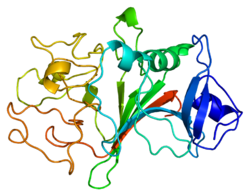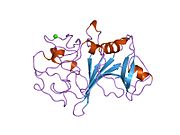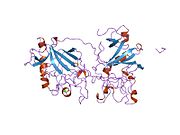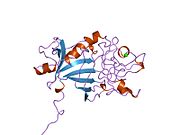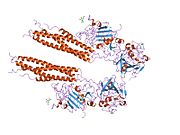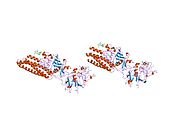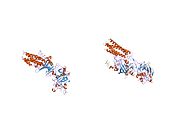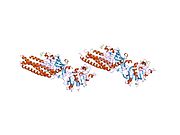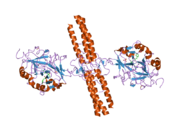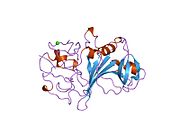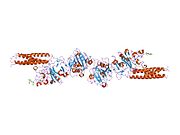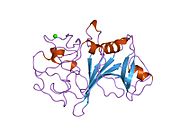Protein-coding gene in the species Homo sapiens
Fibrinogen gamma chain, also known as fibrinogen gamma gene (FGG), is a human gene found on chromosome 3.
The protein encoded by this gene is the gamma component of fibrinogen, a blood-borne glycoprotein composed of three pairs of nonidentical polypeptide chains. Following vascular injury, fibrinogen is cleaved by thrombin to form fibrin which is the most abundant component of blood clots. In addition, various cleavage products of fibrinogen and fibrin regulate cell adhesion and spreading, display vasoconstrictor and chemotactic activities, and are mitogens for several cell types. Mutations in this gene lead to several disorders, including dysfibrinogenemia, hypofibrinogenemia and thrombophilia. Alternative splicing of the mRNA chain results in two transcript variants; the common γA chain and the alternatively spliced γ' chain. Approximately 10% of the total plasma fibrinogen consists of γA/γ' fibrinogen, with <1% consisting of γ'/γ' fibrinogen. Increased and decreased levels of γA/γ' fibrinogen have been associated with coronary artery disease and deep vein thrombosis respectively. In the lung parenchyma of smokers, upregulation of FGG transcript levels has been reported.
References
- ^ GRCh38: Ensembl release 89: ENSG00000171557 – Ensembl, May 2017
- ^ GRCm38: Ensembl release 89: ENSMUSG00000033860 – Ensembl, May 2017
- "Human PubMed Reference:". National Center for Biotechnology Information, U.S. National Library of Medicine.
- "Mouse PubMed Reference:". National Center for Biotechnology Information, U.S. National Library of Medicine.
- Emeis J (2007). "A guide to murine coagulation factor structure, function, assays, and genetic alterations". Journal of Thrombosis and Haemostasis. 5 (4): 670–679. doi:10.1111/j.1538-7836.2007.02408.x. PMID 17403201.
- "Entrez Gene: FGG fibrinogen gamma chain".
- Pintarelli G, Noci S, Maspero D, Pettinicchio A, Dugo M, De Cecco L, Incarbone M, Tosi D, Santambrogio L, Dragani TA, Colombo F (September 2019). "Cigarette smoke alters the transcriptome of non-involved lung tissue in lung adenocarcinoma patients". Scientific Reports. 9 (1): 13039. Bibcode:2019NatSR...913039P. doi:10.1038/s41598-019-49648-2. PMC 6736939. PMID 31506599.
Further reading
- Doolittle RF (1984). "Fibrinogen and fibrin". Annu. Rev. Biochem. 53: 195–229. doi:10.1146/annurev.bi.53.070184.001211. PMID 6383194.
- Herrick S, Blanc-Brude O, Gray A, Laurent G (1999). "Fibrinogen". Int. J. Biochem. Cell Biol. 31 (7): 741–6. doi:10.1016/S1357-2725(99)00032-1. PMID 10467729.
- Everse SJ (2003). "New insights into fibrin (ogen) structure and function". Vox Sang. 83 (Suppl 1): 375–82. doi:10.1111/j.1423-0410.2002.tb05338.x. PMID 12617173. S2CID 21813767.
- Mosesson MW (2003). "Fibrinogen gamma chain functions". J. Thromb. Haemost. 1 (2): 231–8. doi:10.1046/j.1538-7836.2003.00063.x. PMID 12871494. S2CID 40708829.
- Scott EM, Ariëns RA, Grant PJ (2005). "Genetic and environmental determinants of fibrin structure and function: relevance to clinical disease". Arterioscler. Thromb. Vasc. Biol. 24 (9): 1558–66. doi:10.1161/01.ATV.0000136649.83297.bf. PMID 15217804. S2CID 21298700.
| PDB gallery | |
|---|---|
|
| Coagulation cascade | |||||||||
|---|---|---|---|---|---|---|---|---|---|
| Coagulation factors |
| ||||||||
| Anticoagulant factors | |||||||||
| Fibrinolytic factors | |||||||||
| Coagulation markers |
| ||||||||
This article on a gene on human chromosome 4 is a stub. You can help Misplaced Pages by expanding it. |
